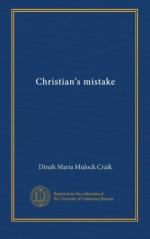“We have likewise settled that he shall start off for a long tour in Greece and Egypt with an old friend of mine, who will be none the worse for the companionship of such a brilliant young fellow. Besides, it will break off all bad associations, and give him a chance of ’turning over a new leaf,’ as people say. Somehow I feel persuaded that he will.”
“Thank God!”
“I too say thank God; for his mother was a good friend to me when I was his age. He is only just one-and-twenty. There may be a long successful life before him yet.”
“I hope so,” said Christian, earnestly. “And perhaps a happy one too. But it could never be half so happy as mine.”
Thus did these two, secure and content, rejoice over the “lost piece of silver,” believing, with a pertinacity that some may smile at, that it was silver after all.
“One thing more. He will be at least three years away; and no one knows what may happen to him in the mean time, he says. He would like to shake hands with you before he goes. Have you any objection to this?”
“None.”
“Come then with me into the study.”
They found Sir Edwin leaning against the mantelpiece, with his head resting on his arms. When he raised it, it was the same dashing, handsome head, which a painter might have painted for an angel or an evil spirit, according as the mood seized him. But now it was the former face, with the mouth quivering with emotion, and something not unlike tears in the brilliant eyes.
“Sir Edwin, according to your desire, my wife has come to wish you good-by and good speed.”
Christian held out her hand gently and gravely:
“I do wish it you—good speed wherever you go.”
“Thank you, Mrs. Grey, Good-by.”
“Good-by.”
And so they parted—these two, whose fates had so strangely met and mingled for a little while—parted kindly, but, totally without one desire on either side that it should be otherwise. They never have met, probably never will meet again in this world.
Chapter 16.
Conclusion.
And what became of every body—the every body of this simple record of six months’ household history, such as might have happened in any life? For it includes no extraordinary events, and is the history of mere ordinary people, neither better nor worse than their neighbors, making mistakes, suffering for them, retrieving them, and then struggling on, perhaps to err again. Is not this the chronicle of all existence? For we are none of us either bad or good, all perfect or wholly depraved, and our merits go as often unrewarded as our sins.
Whether the future career of Sir Edwin Uniacke be fair or foul, time alone can prove. At present the chances seem in favor of the former, especially as he has done the best thing a man of fortune, or any man who earns an honest livelihood, can do—he has married early, and report says, married well. She is an earl’s daughter, not beautiful, and rather poor, but gentle, simple-minded, and good, as many a nobleman’s daughter is, more so than girls of lesser degree and greater presumption.




